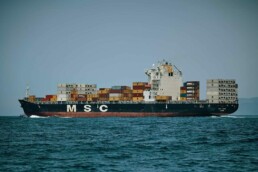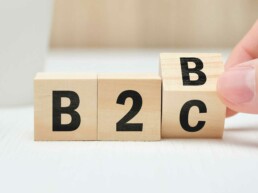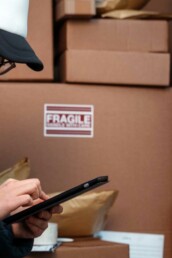The Difference Between B2B and B2C Order Fulfillment
As businesses shift more of their operations online, understanding the differences between B2B (Business-to-Business) fulfillment and B2C (Business-to-Consumer) fulfillment is essential for any company looking to succeed. Whether you’re selling products or services, understanding the unique nuances of each type of fulfillment can help ensure that your customers get the best possible experience. This post will discuss the differences, similarities, and crucial elements in B2B and B2C fulfillment.

B2B and B2C serve different customers.
The customer is the most apparent difference between B2B and B2C fulfillment. B2B fulfillment involves selling products or services to another business, while B2C fulfillment involves selling to individual consumers. This difference affects how companies approach fulfillment, as their customers have different needs.
If you are a B2B company, your customers are larger organizations that will make larger purchases that typically have a regular ordering pattern. They are partnerships that require stronger relationships, communication, and ongoing negotiations. Typically, B2B companies have fewer customers but order far more products.
On the other hand, if you are a B2C company, you serve far more individual customers who make small purchases. Organizations that focus on direct-to-consumer operations have thousands of individual customers. The relationship is primarily transactional and requires little, if any, connection.

B2B and B2C have different order quantities.
Regarding B2B fulfillment, the focus is less on individual orders and more on larger, complex orders. Businesses typically purchase in bulk, which means that B2B fulfillment must be able to handle larger orders and accommodate customized packaging and labeling. B2B businesses may also have strict deadlines for delivery and require specialized shipping options, such as freight services.
In contrast, B2C fulfillment is all about individual orders. Consumers order smaller quantities and expect to receive their orders quickly and with minimal fuss. B2C fulfillment must be able to promptly process and ship individual orders, and companies must be prepared to handle the influx of demands during peak times, such as the holiday season.

B2B and B2C have different shipping methods.
B2B fulfillment utilizes various shipping methods, depending on product size and type. Standard shipping methods include palletized truckload, less-than-truckload (LTL), freight, and parcel delivery services. These are optimized for cost and time savings while providing reliable and safe delivery. They typically have longer delivery times and require specialized equipment.
On the other hand, B2C fulfillment uses parcel delivery services, such as USPS, UPS, and FedEx. These services are often less expensive and faster than B2B shipping methods, making them the preferred choice for B2C fulfillment. Additionally, these services offer various customization and tracking options, allowing customers to track their packages and ensure their orders are delivered quickly and safely.

B2B and B2C fulfillment costs vary.
Obviously, the larger and bulkier orders placed by B2B companies will cost more. The orders’ sheer volume, weight, and size directly affect the shipping cost. Furthermore, fulfilling these orders requires special equipment and handling, which adds to the fees. Many B2B vendors and manufacturers are far away from the distribution center. This adds to the cost.
B2C fulfillment has relatively low costs compared to B2B. This is due to the smaller packages, distances to delivery, and weight of the items. More shipments require fulfillment but are lighter, smaller, and travel less distance, so they have lower costs associated.
Beginner’s Guide to Third-Party Logistics (3PL)
The world of e-commerce is always changing, therefore understanding the roll of Third-Party Logistics is integral to keeping up. In light of this our beginner’s guide to third-party logistics (3PL) will delve into the essential aspects, offering insights into fulfillment services, warehousing, and much more.
Read More…
Overall, the key difference between B2B and B2C fulfillment is the customer. Whomever the customer is, determines the needs, costs, and processes to fulfill. B2B fulfillment is about accommodating large, complex orders, while B2C fulfillment focuses on individual orders. Understanding these differences can help companies ensure they meet their customers’ needs, no matter what type of fulfillment they’re dealing with. Falcon Fulfillment is an expert in the B2C space regarding direct-to-consumer fulfillment.





